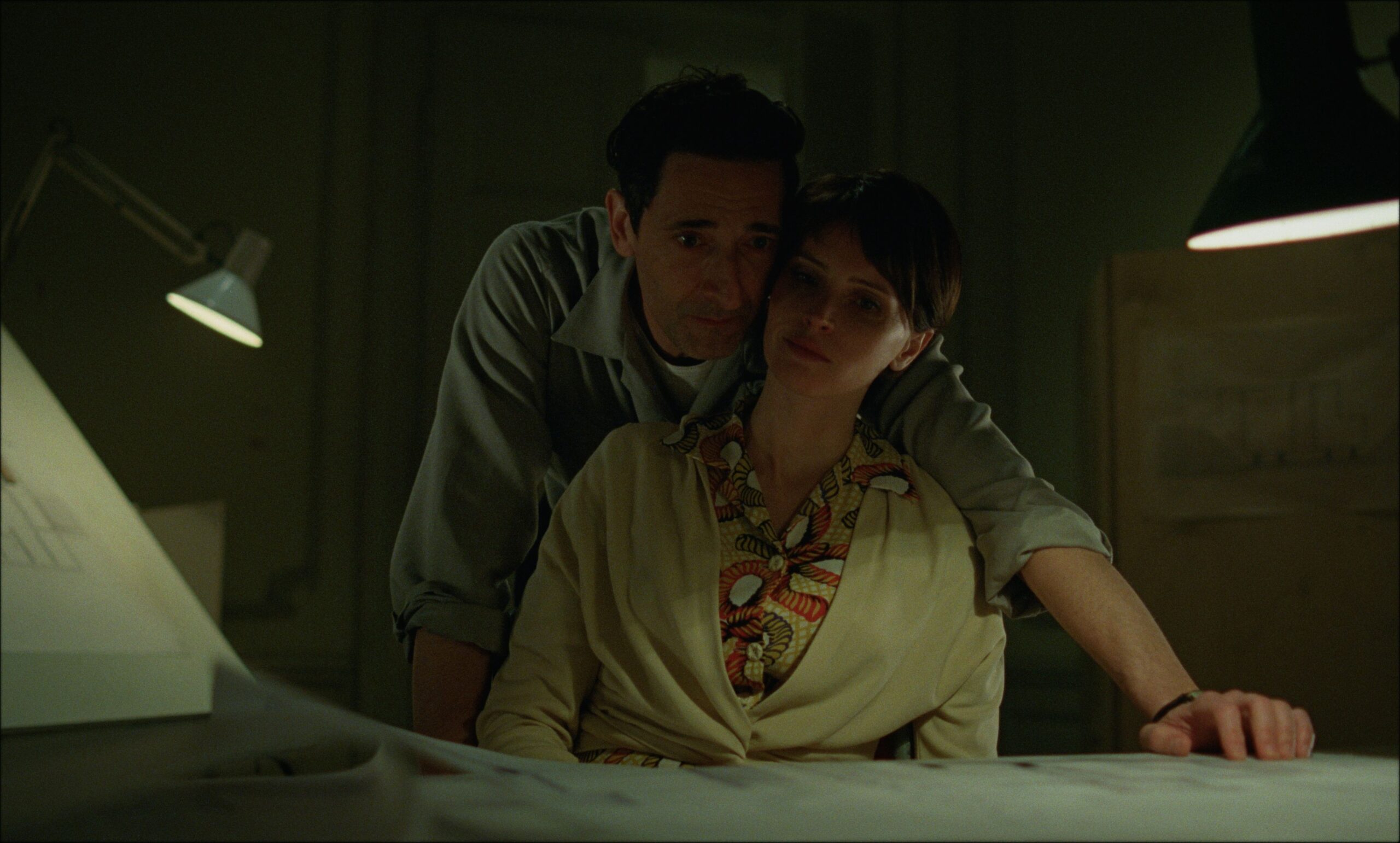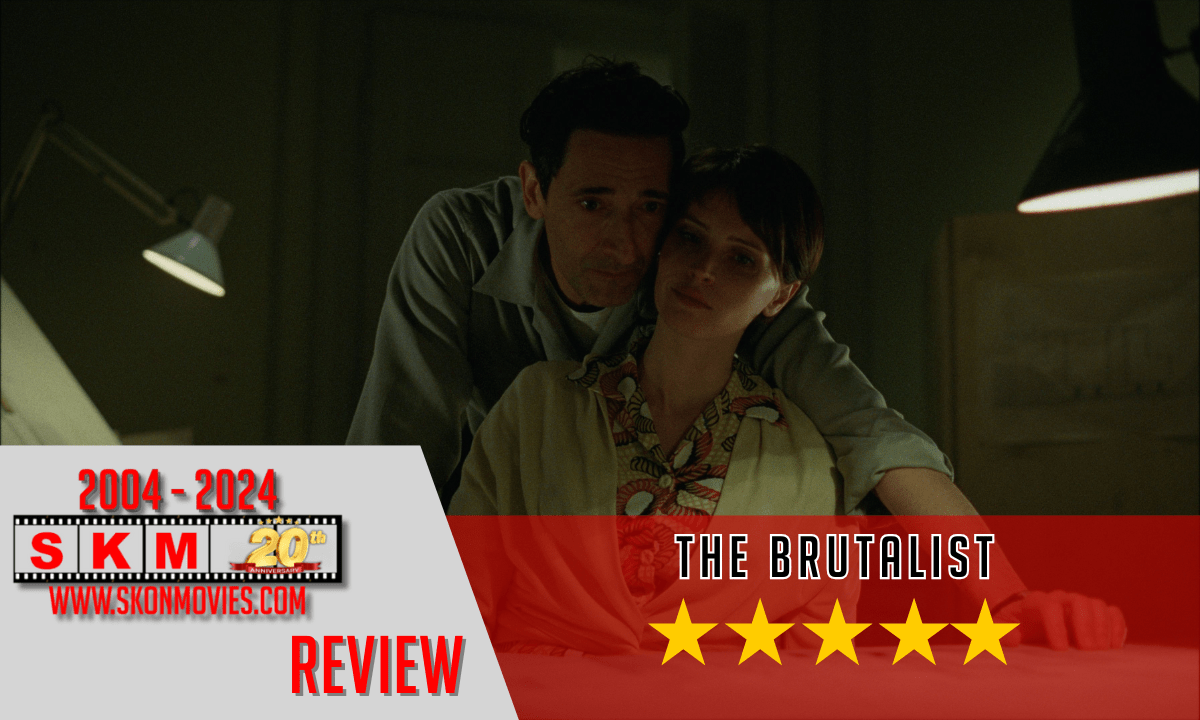Content Advisory: Rape and Sexual Assault, Needles or drug addiction, Graphic sexuality or pornography, The Holocaust
A Jewish Hungarian architect immigrates to the United States after the Second World War in The Brutalist. In 1947, Holocaust survivor László Tóth (Adrien Brody) emigrates from Budapest to Philadelphia, where he is taken in by his cousin Attila (Alessandro Nivola) and his wife Audrey (Emma Laird). While awaiting word of when his wife Erzsébet (Felicity Jones) and niece Zsófia (Raffey Cassidy) would be able to join him in America, László assists Attila with his furniture business. In doing so, László crosses paths with wealthy industrialist Harrison Lee Van Buren (Guy Pearce), when the latter’s son Harry (Joe Alwyn) hires László to renovate Harrison’s library.
Despite initially getting off on the wrong foot, Harrison is impressed when he learns of László’s pedigree as an architect back in Europe. As a result, Harrison commissions László to design an institute in honour of his late mother, featuring a library, theatre, gymnasium, and a chapel, while also offering to extradite Erzsébet’s emigration. However, as László struggles with prejudice for being a Jewish foreigner and an addiction to heroin, the American Dream quickly reveals itself to not be all that it’s cracked up to be.

The Brutalist Synopsis
The Brutalist is the third feature film from actor-turned-filmmaker Brady Crobet (Vox Lux), following the struggles of a Jewish Hungarian architect to achieve the American Dream. The title of the film is in reference to a minimalist style of architecture that rose to prominence in post-war Europe of the 1950s. The Brutalist, running at a total epic length of 3h 35m, takes place over a roughly two decade time span, divided into two distinct parts.
Part 1: The Enigma of Arrival follows Adrien Brody’s protagonist of László Tóth as a new US immigrant trying to make a life for himself. Despite some setbacks and a growing addiction to heroin, László seems set to achieve the American Dream when wealthy industrialist Harrison Lee Van Buren, played by Guy Pearce (The Shrouds), commissions László to build an institute. However, in Part 2: The Hard Core of Beauty, the American Dream starts to crumble for László, beginning with the discovery that his wife Erzsébet, played by Felicity Jones (On the Basis of Sex), and niece Zsófia were more affected by the war than they communicated in their letters. Combined with frequent conflicts over the architectural direction of the institute, the dream quickly turns into a nightmare.
My Thoughts on The Brutalist
There is a quote spoken in the final scene of the 215-minute long The Brutalist, which states “No matter what the others try and sell you, it is the destination, not the journey.” Indeed, The Brutalist earns its epic running time with its well-crafted narrative that breaks down the dark truths of the American Dream. It is not until literally the final two of The Brutalist, the final scene being an epilogue set in 1980, where the themes of the film finally come together and the true meaning of The Brutalist comes to light.
More than two decades after winning as Oscar for the 2002 Holocaust drama The Pianist, Adrien Brody takes on a very similar role as The Brutalist‘s Jewish-Hungarian protagonist László Tóth. Immigrating to America after surviving the Holocaust, László’s first culture shock is the discovery that his cousin Attila has not only adopted the anglicized surname of Miller, but has also converted to his wife Audrey’s Catholic faith. It soon becomes apparent that Audrey is fully on board with Attila letting László stay, as she at one point passively-aggressively asks him when László’s wife will be coming.
László’s experience with Audrey is the first of many instances of anti-foreigner prejudice that he experiences throughout the course of the film. At first, László’s acclaim as a European architect gets him into the good graces of Harrison Lee Van Buren and his children, Harry and Maggie (Stacy Martin). However, the facade begins to crack as László gets into conflicts with his construction partners Leslie Woodrow (Jonathan Hyde) and Jim Simpson (Michael Epp), resulting in the Lee Van Buren family to soon reveal their true colours.
I don’t want to get too deep into the specifics of how the plot of The Brutalist develops, though the Jewish experience plays a major role in the film. This is highlighted early in the film during a montage of László designing a furniture set, accompanied by audio of a United Nations speech establishing the state of Israel. As such, despite being a period film, The Brutalist can be seen as a contrast between post-war Jews establishing a state for themselves following their persecution during the Second World War, to the modern state of Israel being condemned for taking land from Palestine. Even as an Irish-Italian Catholic, I was able to greatly relate to the struggles faced by László and his family in America.
The Brutalist features strong performances all-round, built around the lead performance by Adrien Brody, which is arguably his best role since The Pianist. Felicity Jones has the challenge of only being present through voiceover during the first half of the film, though she ends up giving a career best performance, particularly during her final scene in the film. Then there is Guy Pearce as Harrison Lee Van Buren, who despite claiming kinship with László as a Jewish American, reveals himself to be quite emblematic of the worst aspects of the 1%, including the extremely shocking manner he establishes his dominance.
On a technical note, The Brutalist was shot in VistaVision, a 35mm technique where the widescreen image is shot sideways, and projected on 70mm in select screenings. This allows greater depth of field in The Brutalist, which results in the characters being dwarfed by the architectural creations. I also have to make note of the excellent score for The Brutalist by Daniel Blumberg, with the overture being particularly epic.
Despite the length, The Brutalist is an excellent dismantling of the American Dream. Despite being relatively early in his directorial career, Brady Crobet has already established himself with a modern masterpiece. I highly recommend seeking out a 70mm screening of The Brutalist and experience the film in all its epic wonder.

